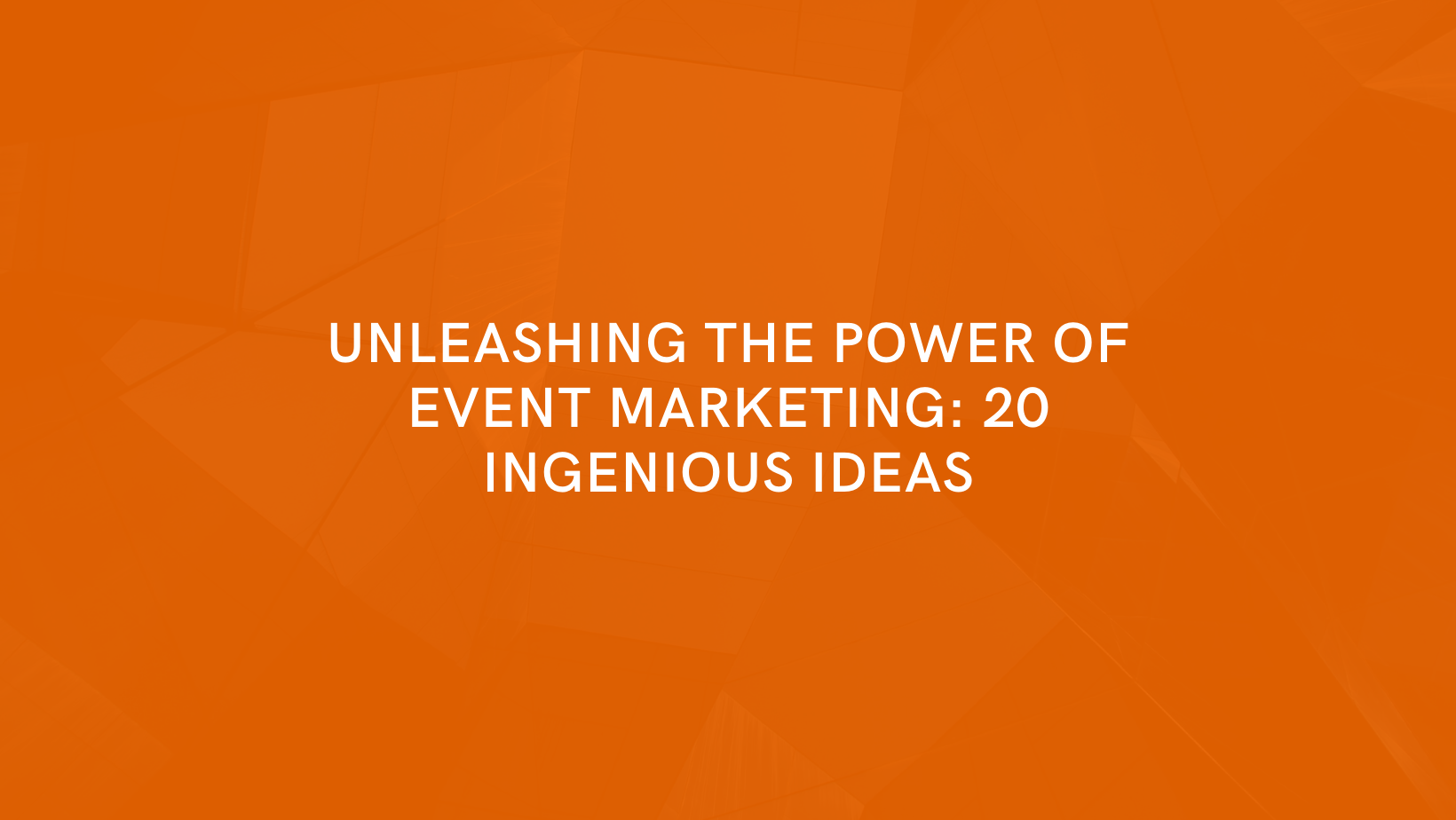In the fast-paced world of marketing, standing out from the crowd is essential. Event marketing is a powerful tool that, when executed thoughtfully, can leave a lasting impression on your audience. Whether you’re planning a product launch, a brand awareness event, or a networking meetup, innovative event marketing ideas can elevate your efforts. In this guide, we’ll explore a range of creative strategies to make your next event a resounding success.
What Is Event Marketing?
Event marketing is a promotional strategy that involves organizing and promoting an event to reach a specific audience and achieve marketing goals. This type of marketing aims to create a memorable experience for attendees, often with the goal of promoting a product, service, brand, or cause. Event marketing can take various forms, including conferences, trade shows, seminars, product launches, webinars, festivals, and more.
Here are some key aspects of event marketing:
- Purpose and Goals: Event marketing can serve various purposes, such as building brand awareness, generating leads, launching a product, fostering customer loyalty, or educating an audience about a specific topic.
- Target Audience: Events are typically designed with a specific audience in mind. Understanding the demographics, interests, and preferences of the target audience helps in planning and promoting the event effectively.
- Planning and Organization: Successful event marketing requires careful planning and execution. This involves tasks like choosing a venue, setting a date, designing the event program, arranging logistics, and securing necessary permits or licenses.
- Promotion and Outreach: Promoting the event is crucial to attract attendees. This can involve various marketing channels, including social media, email marketing, content marketing, paid advertising, and sometimes traditional methods like flyers or direct mail.
- Engagement and Experience: Creating a memorable and engaging experience for attendees is a key aspect of event marketing. This can involve interactive sessions, workshops, entertainment, networking opportunities, and more.
- Measurement and Analysis: After the event, it’s important to evaluate its success. This can include metrics like attendance numbers, lead generation, social media engagement, feedback surveys, and return on investment (ROI).
- Follow-Up and Relationship Building: Post-event communication is crucial for maintaining momentum and building relationships with attendees. This can involve sending thank-you notes, providing additional resources, or inviting them to future events.
- Adaptation and Improvement: Learning from each event is important for future success. Analyzing what worked well and what could be improved helps refine strategies for future events.
Event marketing is a versatile strategy that can be employed by businesses, organizations, non-profits, and individuals for a wide range of purposes. It allows for direct interaction with the target audience, providing an opportunity to convey messages, showcase products, and build relationships in a more personal and engaging manner compared to some other marketing channels.
Event Marketing Tips
1. Virtual Reality Experiences
Incorporating virtual reality (VR) into your event can create an unforgettable experience for attendees. With VR headsets becoming more accessible, consider offering virtual tours of your products or immersive brand experiences. This technology can transport participants to different worlds and leave a lasting impression.
2. Gamification
Introducing elements of gamification can inject excitement into your event. Design interactive games or challenges related to your brand or products. Offer prizes to engage attendees and foster a sense of competition, creating a dynamic and memorable atmosphere.
3. Live Streaming and Webinars
In an increasingly digital world, live streaming and webinars are invaluable tools for reaching a wider audience. Promote your event through various social media channels and consider partnering with influencers or experts in your industry to increase exposure and credibility.
4. Personalized Experiences
Tailor the event experience to individual attendees whenever possible. Use data-driven insights to personalize invitations, content, and even gifts. This not only shows an understanding of your audience but also creates a deeper connection between attendees and your brand.
5. Interactive Workshops
Organize workshops that provide tangible value to your attendees. Cover relevant topics related to your industry or products. Interactive sessions foster engagement and leave participants with practical takeaways, solidifying their positive impression of your brand.
6. Themed Events
Selecting a theme that resonates with your target audience can provide a cohesive and memorable experience. From retro nostalgia to futuristic innovation, a well-chosen theme can tie all aspects of your event together and leave a lasting impression.
7. Experiential Installations
Create physical installations that captivate attendees and encourage them to interact with your brand. These could range from art installations to innovative product showcases. The goal is to make your brand’s presence felt in a memorable and immersive way.
8. Inclusive and Diverse Panels
Diversity and inclusivity are not only ethical imperatives but also great marketing strategies. Organize panels or discussions that showcase a range of perspectives and voices. This not only enriches the event experience but also highlights your commitment to inclusivity.
9. Surprise Elements
Incorporate unexpected elements into your event to surprise and delight attendees. This could be a pop-up performance, an exclusive product reveal, or even unexpected giveaways. These surprises can create a sense of anticipation and excitement that lingers long after the event concludes.
10. Post-Event Engagement
Don’t let the momentum fade once the event is over. Engage with attendees through follow-up emails, social media engagement, and surveys. Show appreciation for their participation and gather feedback to improve future events.
11. Sustainability Initiatives
Incorporate sustainability into your event planning. From eco-friendly materials to carbon offset initiatives, showcasing your commitment to the environment can resonate strongly with conscious consumers and enhance your brand’s reputation.
12. Augmented Reality (AR) Experiences
Similar to VR, AR can enhance the event experience. Create interactive AR features that attendees can access through their smartphones. This technology can transform physical spaces, providing a unique and engaging experience.
In conclusion, successful event marketing goes beyond logistics and promotion. It’s about creating an experience that leaves a lasting impression on attendees. By incorporating these innovative ideas into your event planning, you’ll not only captivate your audience but also solidify your brand’s presence in their minds. Remember, the key is to be creative, authentic, and focused on providing value to your attendees. With these strategies, your next event is bound to be a resounding success.





